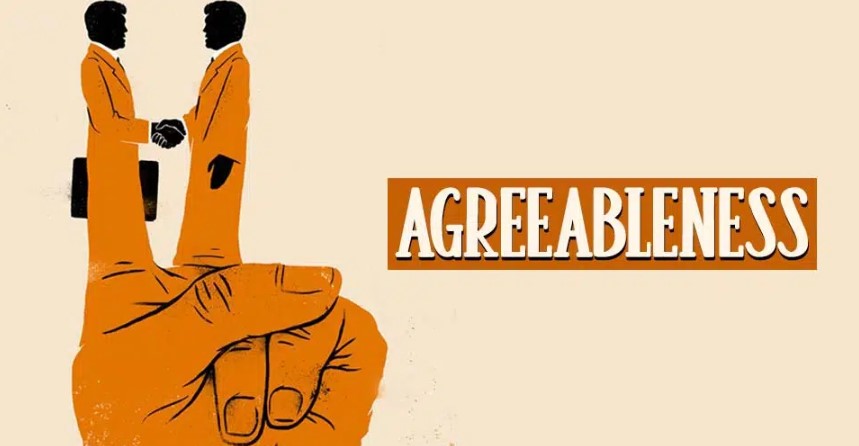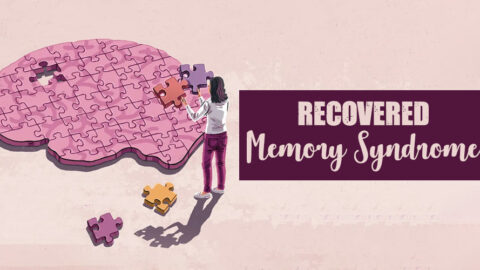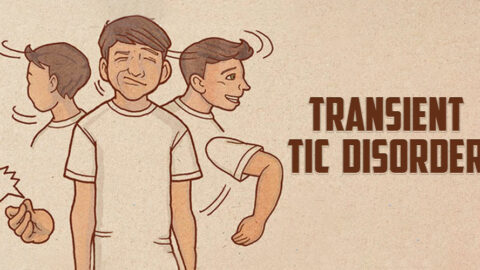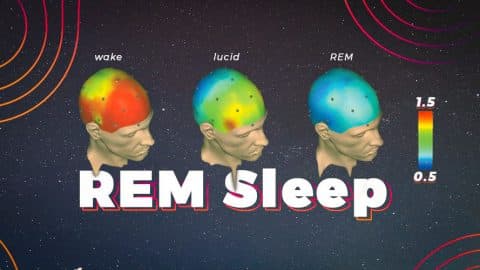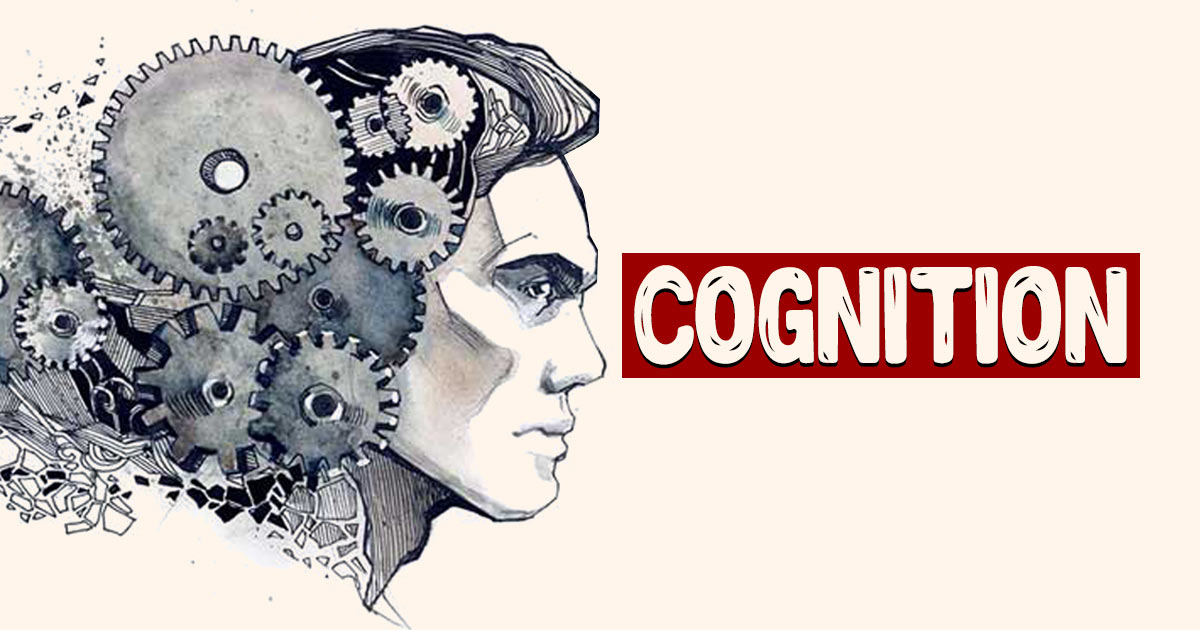Agreeableness is one of the big five personality traits that consists of behavioral characteristics that include being kind, cooperative, warm, considerate, and empathetic. This trait involves a person’s ability to be warm and compassionate towards others.
What Is Agreeableness?
Agreeableness is a personality trait characterized by a person’s ability to trust, cooperate, empathize and be socially friendly. The experts at Mindstar Health explain that it is the “inclination to behave in a friendly, cooperative manner which is not necessarily bound by selfish reasons. It is one of the primary aspects of the five-factor personality model.” People who have a high degree of agreeableness are more trusting, affectionate, altruistic, and more social.
They are particularly more empathetic and show great concern for others. The agreeable people listen to others, feel compassionate, and love serving people in need. They tend to make friends easily. People with this personality trait are more likely to manage their anger and negative emotions and tend to avoid conflict.
Individuals with high levels of agreeable personality are trusting, forgiving, and nice to be around. It may be an advantageous feature since this trait can help in attaining and maintaining popularity. People with this personality trait are the first to help people in need. However, they often struggle with situations that require them to make tough decisions or tough love.
Their intense instinct of going out of their way to help others may also interfere with getting ahead in their career. On the other hand, people with low levels of agreeableness are prone to being hostile, antagonistic, and competitive. They also find it difficult to maintain relationships and are often riddled with disagreements and conflicts.
It is one of the big 5 personality traits that are present in each individual. Each personality dimension is viewed as a continuum i.e even though a person can have a dominant trait such as agreeableness, they may still have other traits present in their personality. In addition to this personality trait, the other big five personality traits are openness, conscientiousness, extraversion, and neuroticism. It is commonly referred to as OCEAN. These traits are helpful in identifying and predicting how people tend to respond in different situations.
Read More About Big 5 Personality Traits Here
Related Studies And Prevalence Of Agreeableness
A 2011 study 1 Noftle, E. E., & Fleeson, W. (2010). Age differences in big five behavior averages and variabilities across the adult life span: moving beyond retrospective, global summary accounts of personality. Psychology and aging, 25(1), 95–107. https://doi.org/10.1037/a0018199 demonstrated that we tend to become more agreeable as we grow older. A 2019 report 2 Kaufman, S. B., Yaden, D. B., Hyde, E., & Tsukayama, E. (2019). The Light vs. Dark Triad of Personality: Contrasting Two Very Different Profiles of Human Nature. Frontiers in psychology, 10, 467. https://doi.org/10.3389/fpsyg.2019.00467 found that those who score low on agreeableness display signs of the dark triad traits such as manipulation and competing with others instead of cooperating. A 2014 study of undergraduate students suggests that experiences of adversity at home during childhood were often found to report lower levels of agreeableness as adults. A 2009 study 3 Ode, S., & Robinson, M. D. (2007). Agreeableness and the Self-Regulation of Negative Affect: Findings Involving the Neuroticism/Somatic Distress Relationship. Personality and individual differences, 43(8), 2137–2148. https://doi.org/10.1016/j.paid.2007.06.035 found that in comparison to disagreeable individuals, agreeable individuals generally engage less in quarrelsome behavior and in more cooperative behavior in daily life.
A 1996 study 4 Graziano WG, Jensen-Campbell LA, Hair EC. Perceiving interpersonal conflict and reacting to it: the case for agreeableness. J Pers Soc Psychol. 1996 Apr;70(4):820-35. doi: 10.1037//0022-3514.70.4.820. PMID: 8636901. confirmed that in terms of social cognitive agreeableness this trait dimension has been associated with less interpersonal conflict and a preference for more socially adaptive modes of conflict resolution. Another 2009 study 5 Laursen, B., Pulkkinen, L., & Adams, R. (2002). The antecedents and correlates of agreeableness in adulthood. Developmental psychology, 38(4), 591–603. https://doi.org/10.1037//0012-1649.38.4.591 attempted to understand the correlation between agreeableness and adulthood.
It was often associated with self-reports of emotional experience and control along with psychophysiological responses to affectively charged stimuli. It was also found that during adulthood, low agreeableness has been found to be a health risk. On the other hand, high levels of agreeableness, especially truth and honesty, is directly linked to longevity.
Characteristics Of Agreeableness
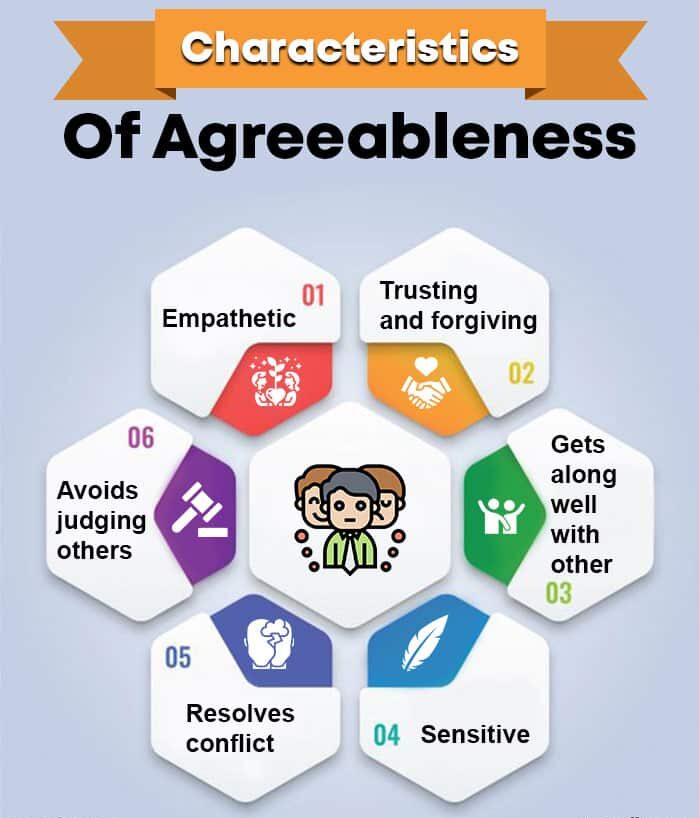
Some of the characteristics of people with a high degree of agreeableness are as follows:
- Puts other people’s needs above their own
- Empathetic
- Feels extreme pleasure when serving others
- Trusting and forgiving
- Gets along well with others
- Popular and liked by everyone
- Cares for others
- Helpful, kind, and considerate
- Sensitive
- Resolves conflict
- Avoids judging others
- Gives other people the benefit of the doubt
- Gets excited to collaborate with others
- Easily makes friends
- Altruistic and perceptive
- Emotionally supportive
Measure Of Agreeableness
The degree of prevalence of agreeableness is measured using self-report inventories. Self-report inventories refer to a psychological test used to measure the prevalence of personality traits. These tests contain statements wherein the individual taking the test decides whether they agree, disagree or fall somewhere in between, with the statements laid out in the questionnaire.
Agreeableness is measured with a self-report questionnaire. Since it is considered a personality dimension and not a diagnosis, the prevalence of this trait among the general population is limited. The level of agreeableness exists in a continuum i.e a person is either very high in, very low, or somewhere in between.
Influence Of Agreeableness On Behavior
Measuring a person’s agreeableness is used to determine their ability to be kind, empathetic, trusting, cooperative, and sympathetic. This shows how well a person is comfortable with society. There are sub traits that further illustrate what makes a person agreeable:
- Altruism
- Cooperation
- Modesty
- Straightforwardness
- Sympathy
- Trust
The sub traits of agreeableness are further explained below:
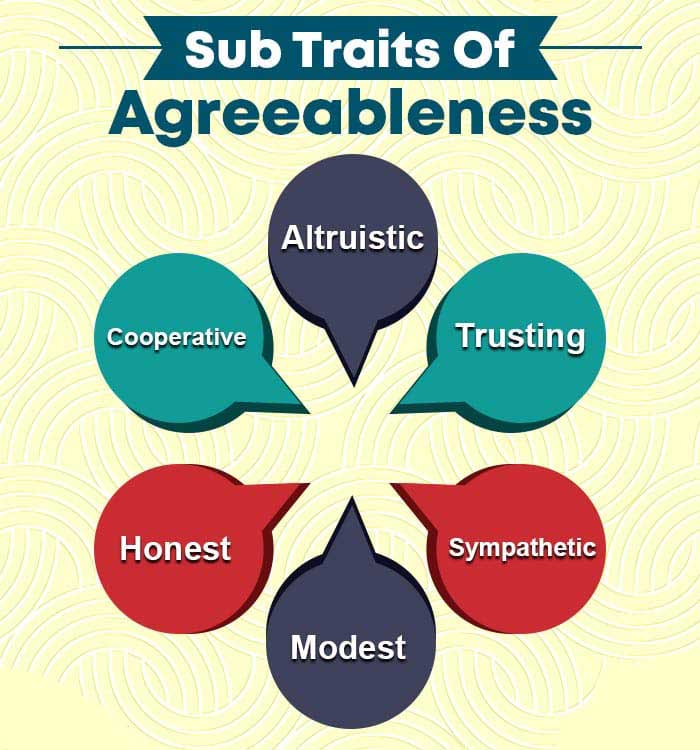
1. Altruistic
People with this trait feel good when they are helping others. They feel internally rewarded for doing good deeds for others and do not really view these acts as self-sacrificing. They feel fulfilled from performing good deeds. On the other hand, people who score low on this trait feel like helping other people is an imposition. They are usually often found to have no desire to change their behavior.
2. Cooperative
People with high levels of agreeableness tend to go out of their way to avoid confrontation. They love peace and are often peacemakers. The disadvantage of being extremely cooperative is they often compromise their own needs and interests to please other people. On the other hand, people with low scores are more prone to forcing their will on other people. They may also use intimidation and aggression to get things in their favor.
3. Honest
Someone with a high level of this personality trait tends to be more straightforward and sincere. They don’t feel the need to manipulate people to get things done. They are usually seen as genuine and nice people. However, low scoring people are often dishonest and believe that there is nothing wrong with being deceptive if it works in their favor. They also tend to be more secretive.
4. Modest
High scoring agreeables are often found to be very modest and rarely claim to be better than others. They are also found to have low self-esteem. Low scoring agreeables may be more arrogant or is not afraid of taking advantage of other people. They may also have a persistent need to display that they are superior to others.
5. Sympathetic
People with a high score in agreeableness are found to be more sympathetic and eager to help others in need. They are also emotionally intelligent and empathetic when it comes to people suffering from difficult situations. People with low scores do not believe in empathizing with people who are suffering and are not merciful.
6. Trusting
Individuals with high levels of agreeableness are more inclined to trusting other people and believing they mean well. They don’t believe in judging other people and often care for others unconditionally. On the other hand, people with low levels often view others as selfish and believe that everyone’s out there to serve their own interests. They may also feel threatened by other people because they believe that it may interfere with their interests.
Common Behavioral Characteristics Of Agreeable People
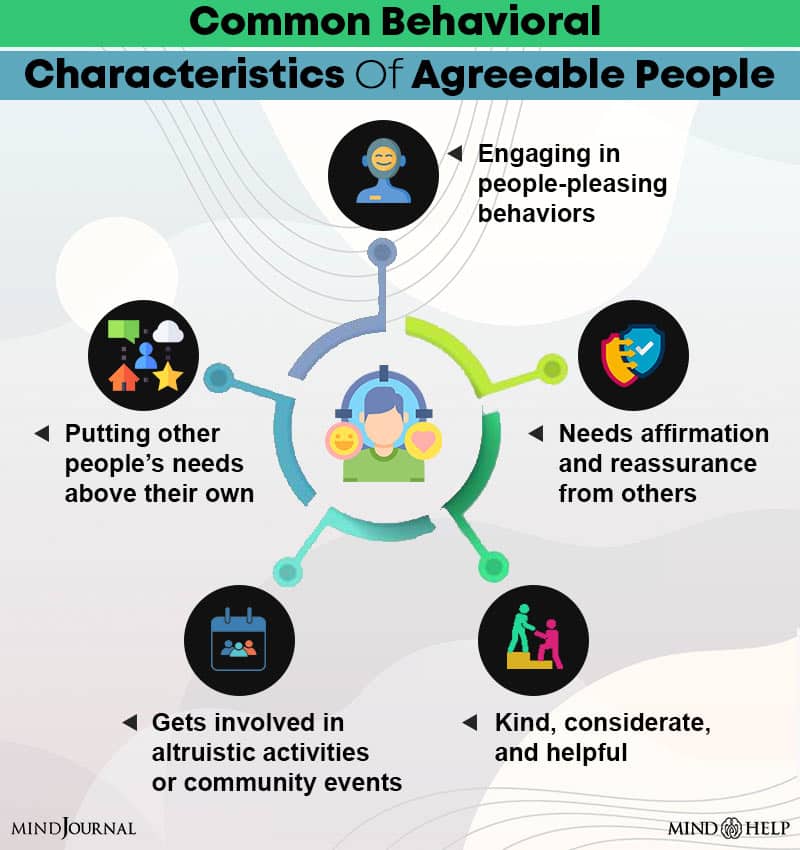
There are a few common characteristics for people with high levels of agreeableness. They include:
- Putting other people’s needs above their own
- Engaging in people-pleasing behaviors
- Needs affirmation and reassurance from others
- Kind, considerate, and helpful
- Gets involved in altruistic activities or community events
- Tends to compromise on their ideas and ideals in an attempt to avoid conflict
- Refrains from being contradicting
- Tries to be honest and sincere
Making Sense Of Agreeableness Tendencies
Agreeableness is one of the factors that help to determine an individual’s personality. Even if someone scores high in this trait, there may be other traits present in them as well. These other traits include openness, extraversion, conscientiousness, and neuroticism. So even though this personality trait may be prevalent, it may not be a defining trait of the individual concerned. All individuals have some prevalent characteristics from all the big five personality traits.
Agreeableness At A Glance
- Agreeableness is one of the big five personality traits that consists of behavioral characteristics, like being kind, cooperative, warm, considerate, and empathetic.
- People who have a high degree of agreeableness are more trusting, affectionate, altruistic, and more social.
- Self-report inventories refer to a psychological test used to measure the prevalence of personality traits.
- Measuring a person’s agreeableness is used to determine their ability to be kind, empathetic, trusting, cooperative, and sympathetic.
- Agreeableness is one of the factors that help to determine an individual’s personality.

